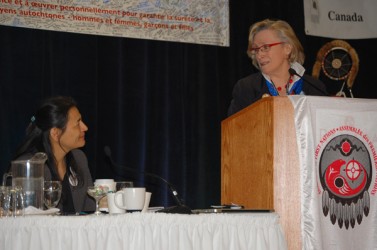Article Origin
Volume
Issue
Year
Getting Canadians involved in an issue that transcends racial lines is the only way the federal government will move ahead on a call for a National Public Commission of Inquiry into violence against Indigenous women and girls.
“This is an issue that belongs to the broader society,” said Ernie Crey, advisor to the Sto:lo Tribal Council and former social worker. He was speaking to the 400 delegates at a joint Assembly of First Nations and Native Women’s Association of Canada forum held in Edmonton April 9 and 10.
Crey called for a national working committee comprised of Aboriginals and non-Aboriginals. “This government will not hold a national and public inquiry because a handful of people are demanding it …. Once they see a groundswell of support for a national and public inquiry, they will change their minds.”
Both Shawn Atleo, national chief of the AFN, and Michelle Audette, NWAC president, pledged to continue to support community and regional events that would lead to safer communities as well as a national inquiry.
Sitting on a panel that discussed the next steps forward were Members of Parliament Niki Ashton (NDP Churchill) and Carolyn Bennett (Liberal St. Paul’s), who were appointed in March by the federal government to a special parliamentary committee on missing and murdered Aboriginal women.
The idea for the committee came from Bennett and the committee’s formation received unanimous support from Parliament. However, that committee is not enough, said Ashton. “The NDP … will be pushing … that nothing less than a national public inquiry will suffice.”
She referred to the numbers of missing and murdered Aboriginal women and girls as a “national epidemic.”
Figures collected from NWAC by scouring newspaper articles indicate that more than 600 Aboriginal women and girls have either gone missing or been murdered over the past two decades.
Bennett said it was a “preventable epidemic.”
She called for direction from the Aboriginal community in moving the special parliamentary committee forward.
“I want to make sure that you will help us to build a work plan that is meaningful to you. This will not work top down. It’s got to be bottom up.”
While the movement continues to force the federal government to hold a national inquiry, delegates were encouraged to do work in their communities as preventive measures.
Steven Point, chair of the advisory committee on the safety and security of vulnerable women which provides guidance to the implementation of the recommendation from the Missing Women Commission of Inquiry held in British Columbia, said that young women leaving home, many leaving the reserves for the first time, needed to be prepared for city living. He said that the issue of violence against women was an issue that concerned everyone.
Ashton condemned the federal government for not only dragging its feet on a national public inquiry but also for cutting funding for programs that address family violence.
“They have cut the very programs and the very supports that could be there to try and find the solutions,” she said.
Both AFN and NWAC have been consistent in their call for a public federal inquiry into missing and murdered Aboriginal women and girls. Last year, a petition, which now has 8,000 signatures, began circulating.
Delegates were presented with a workbook developed by the AFN and NWAC to provide input into developing a national action plan. The information is to be “used to develop a plan that is grounded in the experiences of Indigenous women and national in scope, with concrete recommendations for various levels of governments, agencies and individuals to end violence and make our communities safer.”
Recommendations from the forum, as well as input following the forum, will be incorporated into a draft national action plan, which will then go to communities and leaders for further input.
- 2695 views

